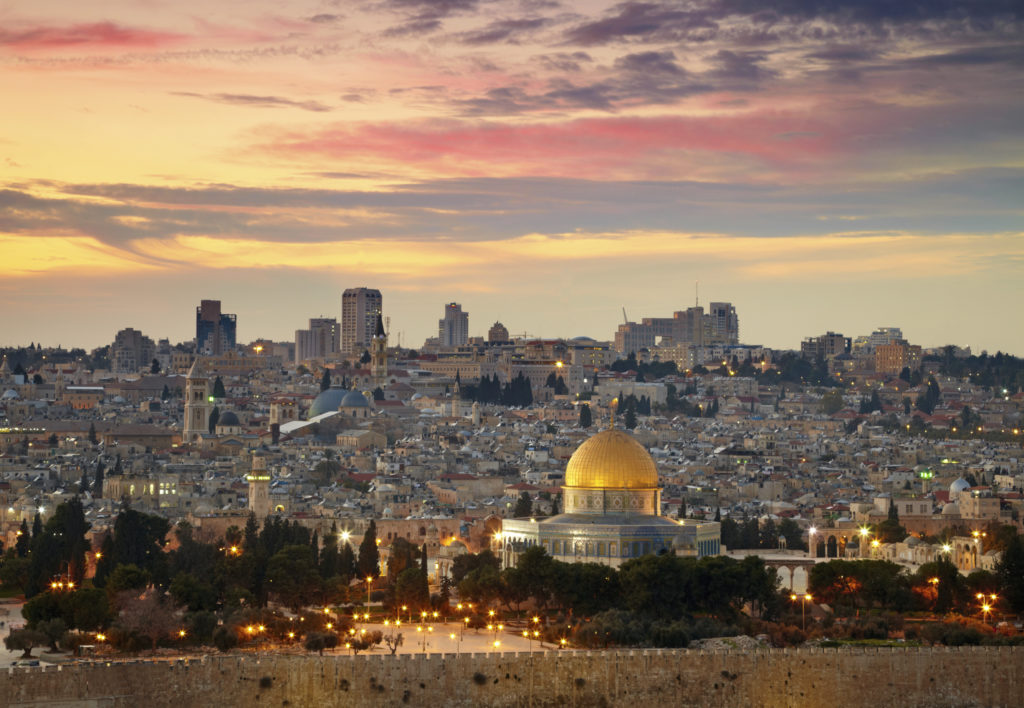Australia/Israel Review
Editorial: Acknowledging the Facts
Dec 19, 2017 | Colin Rubenstein

Colin Rubenstein
Imagine if no other country would accept Canberra as the capital of Australia. We have our parliament, all government ministries, the High Court there, but to placate a neighbour with more international support, and a habit of issuing violent threats, no country will acknowledge that Canberra is the capital. Instead, they all locate their embassies in Melbourne, and insist the capital is there.
That, in a nutshell, is Israel’s situation, or at least it was, with one or two current exceptions, until Donald Trump’s historic announcement that the US officially recognises Jerusalem as the capital, and directing the State Department to begin the lengthy process, amounting to several years, of moving the US Embassy.
Of course, as with everything involving Israel, it’s a bit more complicated, with parts of Jerusalem disputed. However, there is a basic principle of non-discrimination at play. As Trump said, “Israel is a sovereign nation with the right like every other sovereign nation to determine its own capital.”
In reality, it’s not as complicated as those who disagree with Trump’s decision make out. As he said, the announcement does not affect final status issues, such as the ultimate boundaries of Jerusalem, which are deliberately left open, nor preclude whether the Palestinians will have their own capital in the east of the city, an option obviously put back firmly on the agenda should the Palestinians choose to pursue it through the renewed negotiations Trump is seeking to encourage. Israeli PM Netanyahu said it will not affect the status of any holy sites, including those under Muslim control such as the Temple Mount/Al-Aqsa compound.
It just acknowledges the facts. Israel does have its capital in west Jerusalem. This has been part of Israel since its inception in 1948, and no-one who accepts Israel’s right to exist argues that it won’t remain Israel’s capital in any peace deal. Furthermore, for Jerusalem’s more than 3,000-year history, it has always been the spiritual centre of the Jewish world, and has always had a substantial Jewish population, with a Jewish majority since the mid-1800s.
The Trump decision arguably establishes parity between the Israelis and Palestinians. The US consulate in Jerusalem handles US relations with the West Bank and Gaza. It is more like an embassy than a consulate, being one of only two US consulates that reports directly to the State Department rather than the local embassy. Why is it okay for the US diplomatic liaison with the Palestinians to be in Jerusalem, but not its Israeli equivalent?
A prominent argument against the move is that it will make peace harder to achieve. The Palestinians have certainly declared this will end negotiations.
In fact, it is strongly arguable that it will eventually be a positive move for the peace process. The Palestinian threat to end negotiations may have more credibility if the Palestinians hadn’t refused to negotiate in good faith since 2008, when, as Mahmoud Abbas has since admitted, he rejected “out of hand” Israel’s offer of a Palestinian state that included land the equivalent of the entire West Bank and Gaza, not to mention a capital in east Jerusalem.
Since 2014, in fact, the Palestinians have refused to negotiate at all. Instead, they have pursued a strategy of attempting to achieve their state through international pressure on Israel, including its marginalisation and often demonisation, hoping to realise their aims without any of the necessary compromises, such as genuinely accepting Israel’s right to exist in peace as a Jewish state.
In parallel has been a bizarre campaign to erase any Jewish connection to the holy city.
Bill Clinton once remarked that the only new idea Yasser Arafat brought to the Camp David negotiations in 2000 was that there had never been a Jewish Temple in Jerusalem. This appalling exercise in rewriting history has in recent years been wilfully aided by UNESCO and even the UN General Assembly, passing absurdly damaging resolutions, most notably in December 2016 and again just last month, that refer to holy sites in Jerusalem only by their Arab names.
In comments on the recognition, both Trump and Netanyahu took pains to point out the city’s importance to Jews, Muslims and Christians. Palestinian Authority President Mahmoud Abbas, by contrast, starkly denied any Israeli or even Jewish claim to the city, referring to it merely as “an Arab Christian and Arab Muslim city, the capital of the eternal state of Palestine.”
The Palestinians have pursued this counter-productive course of action in the belief that time is on their side. Mr Trump’s announcement demonstrates this is not the case, and should therefore in time encourage the Palestinians to rethink their tactics, and return to negotiations.
Ironically, many of those protesting the Trump announcement the loudest are in favour of recognising Palestine as a state. This is rank hypocrisy – on the one hand claiming Trump has pre-empted a final status issue when he has really done nothing to change the status of the Palestinians, while on the other hand demanding the Palestinians be prematurely awarded the ultimate prize of statehood, meant to be the final step in the negotiating process.
And then there are those exceptions referred to earlier. In April this year, Vladimir Putin announced that Russia would officially recognise west Jerusalem as Israel’s capital, but no threats, no violence and no condemnation resulted on this occasion. Vanuatu has taken the same position, and after the Trump announcement, the Czech Republic made a similar declaration.
It is time the rest of the international community joined the US, Russia, Vanuatu and the Czechs, in acknowledging the obvious. Israel does not deserve be subjected to different treatment to every other country. The strategy of pandering to Palestinian threats and intransigence has achieved nothing, and needs to end. Recognising Jerusalem as Israel’s capital is a good, symbolic, place to start.
Tags: Israel






